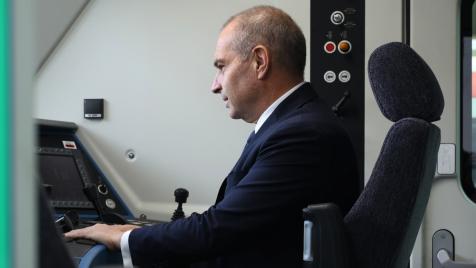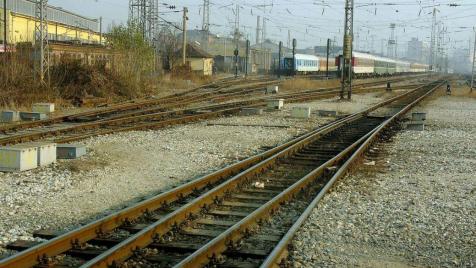In an effort to complete a tender: Multiple-unit trains instead of push-pull trains for Bulgarian railways
As Minister of Transport, Georgi Gvozdeykov has initiated 9 procedures for the delivery of rolling stock but only one has not failed so far

© ECONOMIC.BG / Bulgarian Ministry of Transport
Following another failure of the delivery order of 20 push-pull trains pledged and financed with funds under the Recovery Plan, the Bulgarian Ministry of Transport decided to replace them with single-deck multiple-unit (MU) trains. This became evident from a new tender announced a week ago. Its estimated value is over 600 million euros excluding VAT, with an estimated delivery period of 24 months.
Given the short production timeline (the previous one was 33 months), it is very likely that this order of the Transport Ministry will not be fully implemented.
In less than a year, Interim Transport Minister Georgi Gvozdeykov, launched 9 such procedures related to the provision of new rolling stock to the Bulgarian State Railways, of which only one has been successful. Even the procedures leading up to the selection of the contractor and the signing of the contract have now been placed under scrutiny.
Last week, for example, it became clear that Stadler Polska Sp. Z.o.o. is abandoning the contract to deliver 35 MU trains and also requested the termination of the contract signed in April for the delivery of the 7 double-decker trains. Thus, in practice, three of the four planned contracts for the delivery of new rolling stock to Bulgaria are at risk. The procedure for the delivery of locomotives was carried out without problems, but only at half capacity since only 9 of the planned 18 locomotives were commissioned.
Instead of push-pull trains
At the end of June, the Bulgarian Ministry of Transport was in talks with the European Commission regarding a possible replacement of the planned 20 push-pull trains with another type of rolling stock. The news was announced in an interview with Minister Gvozdeykov, although he did not specify what the other type of trains was going to be.
Now at least this has become clear. The push-pull trains in question have been replaced by single-deck low-zero electric multiple-unit trains with a capacity of at least 300 seats and a running speed of up to 160 km/h. However, in practice, the Transport Ministry thus duplicates the train order from another contract – the one for the 35 MU trains. The only difference is that the capacity of these was supposed to be 200 seats.
The delivery deadline, in contrast to the previous procedure, has been significantly shortened. The other MU trains were supposed to be delivered within 33 months, now that period is 24 months. This is necessitated by the requirement that Bulgaria use the recovery funds by the end of August 2026. Moreover, the tender is an open call. The previous tenders provided for direct negotiation with the companies.
For the new contract, similar to the previous ones, a 15-year period of maintenance and warranty service is foreseen, together with personnel training.
The total estimated value of the order is over 600 million euros excluding VAT. It includes the delivery of the 20 MU trains and their warranty maintenance for no less than 36 months, at the cost of 330 million euros excluding VAT. Another 102 million euros excluding VAT have been earmarked for scheduled maintenance, and 16.5 million euros excluding VAT for unscheduled maintenance. In addition, 33 million euros excluding VAT will go for extraordinary repairs. More than 120 million euros excluding VAT are planned for the delivery of an additional 5 trains.
A bidder that offers a price for the execution of the order that exceeds the total estimated value specified by the contracting authority, as well as any of the estimated values of the individual activities specified above, will be removed from participation in the bidding procedure," states the tender documentation.
The change of train type came about after the direct negotiation procedure derailed in mid-April. It was terminated because one of the companies did not extend the term of its offer due to an investigation by the European Commission, and for the other company, the evaluating committee found a number of irregularities in the technical parameters and an excessively long delivery period.
Chronology of many contracts and little success
Even though Georgi Gvozdeykov promised, as soon as he became Acting Minister of Transport, that he would do everything possible to complete the 4 planned orders under the Recovery Plan, so far only one of them has been kind of successful. The minister, who was first a member of the liberal "We Continue the Change" party, then decided to stay on in the caretaker government linked to GERB and was even included in the proposed GERB government earlier this month. He justified his political metamorphoses with a desire to finish his work on the train orders.
In fact, when Gvozdeykov became transport minister he saw that the relevant contracts had already been started after a delay of 8 months by his predecessor Hristo Alexiev. However, these contracts also provided for the construction of repair bases for the trains, for which there was no secured funding. This was precisely one of the reasons why Gvozdeykov terminated the orders at the end of June 2023 and thus hampered their execution.
Since then, the ministry headed by him has launched a total of 9 tenders for new rolling stock. The first attempt was made in September 2023, when it launched four tenders for the supply of trains and locomotives. The fate of these orders was different, and the only problem-free contract was the one for the delivery of 18 locomotives. Unlike other orders, it was not appealed by companies.
The successful contract was divided into two separate parts and at the end of 2023 the Transport Ministry chose the Bulgarian company Express Service to deliver the 9 electric shunting locomotives for non-electrified depots. The value of the contract was a little over 5.2 million euros without VAT, and very soon the ministry will be ready to accept the first manufactured locomotive.
However, the second part of the contract – the one regarding the supply of 9 locomotives for partially electrified depots – was terminated. Seven months after the fact, the ministry has not announced anything about that; a new contract has not been hinted at either.
The problematic tenders
The rest of the tenders were even less successful. As mentioned previously, one concerns the delivery of 20 push-pull trains, another is for 35 electric MU trains, and another is for 7 double-deckers. These tenders were marked by appeals from large international companies, stoppages, changes in conditions, etc.
The first open contract for the delivery of the 35 MU trains started in September 2023. A month later it was stopped due to a complaint by Škoda Transportation, and in November the Bulgarian Commission for the Protection on Competition (CPC) declared it illegal. The Transport Ministry did not appeal the decision of the CPC.
Thus, in January 2024, a new order was launched with clearer requirements. In March, it was also appealed, this time by the French company Alstom, but the CPC did not respect the company's reasons. In April, however, the tender was terminated on the grounds that the two offers of the bidding companies - the Polish Pesa and the Czech Skoda Transportation - did not meet the requirements of the contracting authority.
In May 2024, the procedure was started yet again, but this time the Transport Ministry wanted to negotiate directly with the companies. 4 international companies were invited for talks, and at the beginning of July, Stadler was chosen as the contractor. However, it subsequently withdrew from the procedure to be replaced by the runner-up - Pesa. Yet, there is still no information on whether a contract will be signed.
The tender procedures for the delivery of the 7 double-decker trains were also unsuccessful. The first one was launched in September 2023. A month later, it was temporarily suspended due to a complaint by Stadler. However, the CPC dismissed it and it continued.
In January 2024, it became clear that the tender was terminated because the only bid submitted did not meet the requirements of the contracting authority. At the time, the only interest came from Consortium 7 DDEMU, which counts China's CRRC Zhuzhou Locomotive CO as a participant.
In February 2024, a new tender procedure was launched. At the beginning of April, it became clear that only Stadler showed interest by having submitted an offer. The company was selected as the contractor and the contract was signed at the end of that month.
Unexpectedly, a few days ago, the Transport Ministry announced that Stadler was now refusing the order and wanted to terminate the signed contract. Even if a new tender is launched, the delivery period will be too short due to the set requirements for the absorption of the recovery funds until August 2026. This means that it is very likely that Bulgaria will not get any double-decker trains.
In summary - the two orders entrusted to Stadler - for the 7 double-decker trains and the 35 MU trains - have failed and their successful completion under a new contract is rather questionable. The planned 20 push-pull trains have been replaced by a different train type, for whose production a new tender has recently been launched. The only almost successful order has been the one for the delivery of 9 locomotives.
Translated by Tzvetozar Vincent Iolov

 Gloria Hristova
Gloria Hristova 



